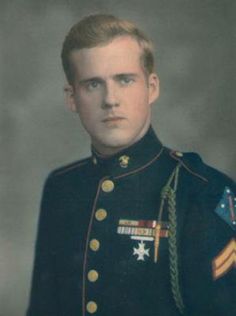Eugene Sledge facts for kids
Quick facts for kids
Eugene Sledge
|
|
|---|---|

Sledge in 1946
|
|
| Birth name | Eugene Bondurant Sledge |
| Nickname(s) | Sledgehammer |
| Born | November 4, 1923 Mobile, Alabama, U.S. |
| Died | March 3, 2001 (aged 77) Montevallo, Alabama, U.S. |
| Place of burial |
Pine Crest Cemetery, Mobile, Alabama
|
| Allegiance | United States |
| Service/ |
United States Marine Corps |
| Years of service | 1942–1946 |
| Rank | Corporal |
| Unit | K Company, 3rd Battalion, 5th Marines, 1st Marine Division |
| Battles/wars | World War II
|
| Spouse(s) |
Jeanne Arceneaux
(m. 1952) |
| Children | 2 |
| Other work | Professor of biology, author |
Eugene Bondurant Sledge (born November 4, 1923 – died March 3, 2001) was an American Marine, a university professor, and a writer. He is best known for his book, With the Old Breed: At Peleliu and Okinawa. This book shares his experiences fighting in World War II. It was used as a source for the Ken Burns PBS documentary The War and the HBO miniseries The Pacific. In The Pacific, actor Joseph Mazzello played Eugene Sledge.
Contents
Eugene Sledge's Life Story
Growing Up in Alabama
Eugene Bondurant Sledge was born on November 4, 1923, in Mobile, Alabama. His father, Edward Simmons Sledge, was a doctor. His mother, Mary Frank Sturdivant Sledge, was a dean at Huntingdon College. In 1935, his family moved to a home called Georgia Cottage in Mobile.
Eugene finished Murphy High School in Mobile in the spring of 1942. His older brother, Edward Simmons Sledge II, was also in the military. He became an officer in the United States Army and served in Europe during the war.
When Eugene was a child, he was often sick. He missed two years of school because of rheumatic fever. This illness left him with a heart murmur. After he got better, his family wanted him to go to college instead of joining the military. His friend, Sidney Phillips, who was already fighting in the war, also told him not to join.
Joining the Marines
In the fall of 1942, Sledge started at the Marion Military Institute in Marion, Alabama. But in December 1942, he decided to join the U.S. Marine Corps. He was first put into an officer training program. However, he chose to become an enlisted Marine so he wouldn't miss the war.
He joined K Company, 3rd Battalion, 5th Marines, 1st Marine Division. There, he served with Corporal R.V. Burgin and Private First Class Merriell "Snafu" Shelton. He became a corporal while fighting in the Pacific Theater.
Sledge was a 60 mm mortarman in battles like Peleliu and Okinawa. When the fighting got too close for his mortar, he helped as a stretcher bearer or a rifleman.
During the war, Sledge wrote notes about his experiences in his pocket-sized New Testament. After the war, he used these notes to write his famous book, With the Old Breed. He was discharged from the Marine Corps in February 1946.
Life After the War
After the war, Sledge went to Auburn University (then called Alabama Polytechnic Institute). He earned a degree in business administration in 1949.
It was hard for Sledge to get used to normal life again. He felt that people didn't understand the horrors of war. He said, "Few seemed to realize how blessed they were to be free and untouched by the horrors of war."
Sledge used to love hunting, but he stopped after the war. He couldn't stand the idea of hurting animals. His father helped him find a new hobby: bird watching. This started his strong interest in ornithology, the study of birds.
When he enrolled at Auburn, a clerk asked if the Marine Corps taught him anything useful. Sledge replied that it taught him "how to kill Japs and try to survive." He added that many of his friends were killed or wounded.
In 1952, Sledge married Jeanne Arceneaux. They had two sons, John and Henry. He returned to Auburn in 1953 and earned a master's degree in botany in 1955.
Becoming a Professor
From 1956 to 1960, Sledge studied at the University of Florida. He earned his doctorate degree in biology in 1960. He also published many papers about helminthology, the study of parasitic worms.
In 1962, Sledge became an assistant professor of biology at Alabama College (now the University of Montevallo). He became a full professor in 1970 and taught there until he retired in 1990. He taught subjects like zoology, ornithology, and how different animals' bodies are built. His students liked him, and he often led field trips.
Later Years and Passing
In 1989, he received an honorary degree from Marion Military Institute. Eugene Sledge passed away on March 3, 2001, after a long fight with stomach cancer.
Awards and Medals
Eugene Sledge received several awards and medals for his service in the Marine Corps. These include:
| 1st row | Combat Action Ribbon | Navy Presidential Unit Citation | |||||||
|---|---|---|---|---|---|---|---|---|---|
| 2nd row | Marine Corps Good Conduct Medal | China Service Medal | American Campaign Medal | ||||||
| 3rd row | Asiatic-Pacific Campaign Medal with two battle stars | World War II Victory Medal | Navy Occupation Service Medal | ||||||
See also
- List of U.S. Marines
- List of non-fiction writers
- List of people from Alabama
- Sidney Phillips
- Romus Burgin
- Merriell Shelton
 In Spanish: Eugene Sledge para niños
In Spanish: Eugene Sledge para niños
 | Jackie Robinson |
 | Jack Johnson |
 | Althea Gibson |
 | Arthur Ashe |
 | Muhammad Ali |

